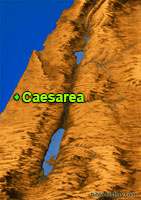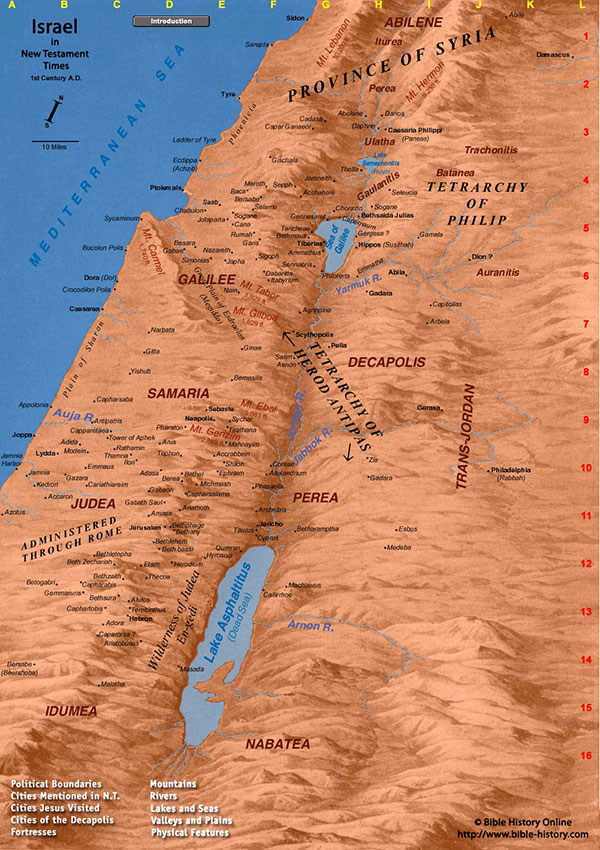Caesarea
C7 on the Map.
Click on the Map
Caesarea in Bible Cities Caesarea in Smiths Bible Dictionary. Ac 8:40; 9:30; 10:1,24; 11:11; 12:19;
18:22; 21:8,16; 23:23,33; 25:1,4,6,13 was situated on the coast of Israel, on
the line of the great road from Tyre to Egypt, and about halfway between Joppa
and Dora. The distance from Jerusalem was about 70 miles; Josephus states it in
round numbers as 600 stadia. In Strabo's time there was on this point of the
coast merely a town called "Strato's Tower," with a landing-place, whereas in
the time of Tacitus Caesarea is spoken of as being the head of Judea. It was in
this interval that the city was built by Herod the Great. It was the official
residence of the Herodian kings, and of Festus, Felix and the other Roman
procurators of Judea. Here also lived Philip the deacon and his four prophesying
daughters. Caesarea continued to be a city of some importance even in the time
of the Crusades, and the name still lingers on the site (Kaisariyeh), which is a
complete desolation, many of the building-stones having been carried to other
towns.
Caesarea in Smiths Bible Dictionary. Ac 8:40; 9:30; 10:1,24; 11:11; 12:19;
18:22; 21:8,16; 23:23,33; 25:1,4,6,13 was situated on the coast of Israel, on
the line of the great road from Tyre to Egypt, and about halfway between Joppa
and Dora. The distance from Jerusalem was about 70 miles; Josephus states it in
round numbers as 600 stadia. In Strabo's time there was on this point of the
coast merely a town called "Strato's Tower," with a landing-place, whereas in
the time of Tacitus Caesarea is spoken of as being the head of Judea. It was in
this interval that the city was built by Herod the Great. It was the official
residence of the Herodian kings, and of Festus, Felix and the other Roman
procurators of Judea. Here also lived Philip the deacon and his four prophesying
daughters. Caesarea continued to be a city of some importance even in the time
of the Crusades, and the name still lingers on the site (Kaisariyeh), which is a
complete desolation, many of the building-stones having been carried to other
towns.
Caesarea (in Palestine): Qeisariyeh [Qeisari]. This ancient city on the
Mediterranean coast of Palestine was the capital of the Roman province of Judea
for about 600 years. It was given the name Caesarea maritima and Caesarea
Palaestina to distinguish it from the other cities with the same name Caesarea.
During the mid third century B.C. the Phoenicians built a small fortified
coastal station here which they called Strato's Tower (Straton was the Greek
form of a Sidonian king). In 96 B.C. was captured by the Hasmonean Alexander
Jannaeus, and thus it became a Jewish community, but after the Roman General
Pompey conquered Palestine in 66 B.C. Strato's Tower became a non-Jewish city.
Later Augustus allotted the city to Herod who rebuilt it into a new city in 10
B.C. in honor of Augustus. It became the administrative centre of the Roman
procurators of the province of Judea, and was the headquarters of the Roman
legions. During the first century A.D. most of its inhabitants were Syrian
Greeks, but many wealthy Jews lived there. Caesarea became the chief port of
Palestine and is mentioned many times in the book of Acts (9:30; 18:22; 21:8).
Philip the evangelist minister here, and Peter preached to gentiles in the home
of the Centurion, Cornelius. Because Caesarea was the residence of the
procurator, it was also the place of Paul's trial (Acts 23:23 ff). He was a
prisoner there for two years (Acts 27:1).
Later Caesarea became a famous church center and in the third-fourth centuries,
the church fathers, origin and Eusebius, taught in its school and its library
(from this library came the edition of the Bible known as the Hexapla. It is
interesting that Jerome said that he saw the original Heb. version of Matthews
Gospels there.
They have been extensive excavations in this ancient city which are still going
on today, much of which are underwater explorations. The ancient amphitheatre
was restored and is being used today, more discoveries include: the city wall,
hippodrome, a paved square with huge statues, the remains of a synagogue and
churches, and many inscriptions including the first recorded discovery of a
reference to Pontius Pilate and Nazareth.
Acts 8:40; 10:1; 18, 22; 23:23, 33; 25:6, 13.
More about Ancient Caesarea 
Israel in the First Century
More About Ancient Caesarea
Caesarea Scriptures
Acts 10:1 -
There was a certain man in Caesarea called
Cornelius, a centurion of the band called the Italian [band],
Acts 23:23 -
And he called unto [him] two centurions, saying, Make ready two hundred soldiers
to go to Caesarea,
and horsemen threescore and ten, and spearmen two hundred, at the third hour of
the night;
Acts 12:19 -
And when Herod had sought for him, and found him not, he examined the keepers,
and commanded that [they] should be put to death. And he went down from Judaea
to Caesarea,
and [there] abode.
Acts 21:8 -
And the next [day] we that were of Paul's company departed, and came unto Caesarea:
and we entered into the house of Philip the evangelist, which was [one] of the
seven; and abode with him.
Acts 25:6 -
And when he had tarried among them more than ten days, he went down unto Caesarea;
and the next day sitting on the judgment seat commanded Paul to be brought.
Acts 8:40 -
But Philip was found at Azotus: and passing through he preached in all the
cities, till he came to Caesarea.
Acts 10:24 -
And the morrow after they entered into Caesarea.
And Cornelius waited for them, and had called together his kinsmen and near
friends.
Acts 21:16 -
There went with us also [certain] of the disciples of Caesarea,
and brought with them one Mnason of Cyprus, an old disciple, with whom we should
lodge.
Acts 25:4 -
But Festus answered, that Paul should be kept at Caesarea,
and that he himself would depart shortly [thither].
Acts 25:13 -
And after certain days king Agrippa and Bernice came unto Caesarea to
salute Festus.
Acts 23:33 -
Who, when they came to Caesarea,
and delivered the epistle to the governor, presented Paul also before him.
Acts 25:1 -
Now when Festus was come into the province, after three days he ascended from Caesarea to
Jerusalem.
Acts 9:30 -
[Which] when the brethren knew, they brought him down to Caesarea,
and sent him forth to Tarsus.
Acts 18:22 -
And when he had landed at Caesarea,
and gone up, and saluted the church, he went down to Antioch.
Acts 11:11 -
And, behold, immediately there were three men already come unto the house where
I was, sent from Caesarea unto
me.
Read The Bible
- 1599 Geneva Bible (GNV)
- 21st Century King James Version (KJ21)
- American Standard Version (ASV)
- Amplified Bible (AMP)
- Amplified Bible, Classic Edition (AMPC)
- Authorized (King James) Version (AKJV)
- BRG Bible (BRG)
- Christian Standard Bible (CSB)
- Common English Bible (CEB)
- Complete Jewish Bible (CJB)
- Contemporary English Version (CEV)
- Darby Translation (DARBY)
- Disciples’ Literal New Testament (DLNT)
- Douay-Rheims 1899 American Edition (DRA)
- Easy-to-Read Version (ERV)
- English Standard Version (ESV)
- English Standard Version Anglicised (ESVUK)
- Evangelical Heritage Version (EHV)
- Expanded Bible (EXB)
- GOD’S WORD Translation (GW)
- Good News Translation (GNT)
- Holman Christian Standard Bible (HCSB)
- International Children’s Bible (ICB)
- International Standard Version (ISV)
- J.B. Phillips New Testament (PHILLIPS)
- Jubilee Bible 2000 (JUB)
- King James Version (KJV)
- Lexham English Bible (LEB)
- Living Bible (TLB)
- Modern English Version (MEV)
- Mounce Reverse Interlinear New Testament (MOUNCE)
- Names of God Bible (NOG)
- New American Bible (Revised Edition) (NABRE)
- New American Standard Bible (NASB)
- New American Standard Bible 1995 (NASB1995)
- New Catholic Bible (NCB)
- New Century Version (NCV)
- New English Translation (NET)
- New International Reader's Version (NIRV)
- New International Version - UK (NIVUK)
- New International Version (NIV)
- New King James Version (NKJV)
- New Life Version (NLV)
- New Living Translation (NLT)
- New Matthew Bible (NMB)
- New Revised Standard Version (NRSV)
- New Revised Standard Version Catholic Edition (NRSVCE)
- New Revised Standard Version, Anglicised (NRSVA)
- New Revised Standard Version, Anglicised Catholic Edition (NRSVACE)
- New Testament for Everyone (NTE)
- Orthodox Jewish Bible (OJB)
- Revised Geneva Translation (RGT)
- Revised Standard Version (RSV)
- Revised Standard Version Catholic Edition (RSVCE)
- The Message (MSG)
- The Voice (VOICE)
- Tree of Life Version (TLV)
- World English Bible (WEB)
- Worldwide English (New Testament) (WE)
- Wycliffe Bible (WYC)
- Young's Literal Translation (YLT)
Table of Contents
Main Menu
- Ancient Assyrian Social Structure
- Ancient Babylonia
- Ancient Canaan During the Time of Joshua
- Ancient History Timeline
- Ancient Oil Lamps
- Antonia Fortress
- Archaeology of Ancient Assyria
- Assyria and Bible Prophecy
- Augustus Caesar
- Background Bible Study
- Bible
- Biblical Geography
- Fallen Empires - Archaeological Discoveries and the Bible
- First Century Jerusalem
- Glossary of Latin Words
- Herod Agrippa I
- Herod Antipas
- Herod the Great
- Herod's Temple
- High Priest's in New Testament Times
- Jewish Literature in New Testament Times
- Library collection
- Map of David's Kingdom
- Map of the Divided Kingdom - Israel and Judah
- Map of the Ministry of Jesus
- Matthew Henry Bible Commentary
- Messianic Prophecy
- Nero Caesar Emperor
- Online Bible Maps
- Paul's First Missionary Journey
- Paul's Second Missionary Journey
- Paul's Third Missionary Journey
- Pontius Pilate
- Questions About the Ancient World
- Tabernacle of Ancient Israel
- Tax Collectors in New Testament Times
- The Babylonian Captivity
- The Black Obelisk of Shalmaneser
- The Books of the New Testament
- The Court of the Gentiles
- The Court of the Women in the Temple
- The Destruction of Israel
- The Fall of Judah with Map
- The History Of Rome
- The Incredible Bible
- The Jewish Calendar in Ancient Hebrew History
- The Life of Jesus in Chronological Order
- The Life of Jesus in Harmony
- The Names of God
- The New Testament
- The Old Testament
- The Passion of the Christ
- The Pharisees
- The Sacred Year of Israel in New Testament Times
- The Samaritans
- The Scribes
Ancient Questions
- Why Do the Huldah Gates Appear Different in Ancient Replicas and Modern Photos?
- What Is the Origin of the Japanese and Chinese Peoples? A Biblical Perspective
- How did the ancient Greeks and Romans practice medicine and treat illnesses?
- What were the major contributions of ancient Babylon to mathematics and astronomy?
- How did the ancient Persians create and administer their vast empire?
- What were the cultural and artistic achievements of ancient India, particularly during the Gupta Empire?
- How did ancient civilizations like the Incas and Aztecs build their remarkable cities and structures?
- What were the major trade routes and trading practices of the ancient world?
- What was the role of slavery in ancient societies like Rome and Greece?
- How did the ancient Mayans develop their sophisticated calendar system?
Bible Study Questions
- Why Do Christians Celebrate Christmas?
- How Many Chapters Are There in the Bible?
- The Five Key Visions in the New Testament
- The 400-Year Prophecy: Unpacking Genesis 15 and the Journey of a People
- The Authorized (King James) Version (AKJV): Historical Significance, Translation Methodology, and Lasting Impact
- Exploring the English Standard Version (ESV): Its Aspects, Comparisons, Impact on Biblical Studies, and Church Use
- A Detailed Historical Analysis of Language Updates in the KJ21: Comparison with Other Versions
- A Detailed Historical Analysis of the American Standard Version (ASV): Comparison to the King James Version, Influence on Later Translations, and Evaluation of Strengths and Weaknesses
- A Detailed Historical Analysis of Amplifications in the Amplified Bible (AMP) and Its Comparison to Other Bible Translations
- Detailed Historical Analysis of the Amplified Bible Classic Edition (AMPC): Examples of Amplifications and Comparative Analysis with Other Bible Translations
About
Welcome to Free Bible: Unearthing the Past, Illuminating the Present! Step into a world where ancient history and biblical narratives intertwine, inviting you to explore the rich tapestry of human civilization.
Discover the captivating stories of forgotten empires, delve into the customs and cultures of our ancestors, and witness the remarkable findings unearthed by dedicated archaeologists.
Immerse yourself in a treasure trove of knowledge, where the past comes alive and illuminates our understanding of the present.
Join us on this extraordinary journey through time, where curiosity is rewarded and ancient mysteries await your exploration.
Recent posts
-

AI Trading Assistants Help New Investors Navigate Complex Markets
For a long time, the arena of investing became ruled by means of people with access to monetary advisors, trading understanding, or insider informatio... -

Understanding the Different Kinds of Charities and Their Impact
Charity has long stood at the intersection of compassion, community responsibility, and transformative social change. From the ancient temples of Meso... -

Best gemstones for stud earrings for 15 years girl
Selecting the perfect pair of stud earrings for a 15-year-old girl is an exciting yet thoughtful process. Stud earrings are a timeless accessory, offe... -

Prayers for Prophets: A Reflection on Reverence and Intercession
Prophets hold a revered status across many of the world’s major religions. As individuals chosen to convey divine messages, they are often remembere... -

How Machine Learning is Reducing Risk in Automated Trading
In today’s fast-paced monetary markets, automated buying and selling has come to be a cornerstone of current making an investment. Algorithms now ex...